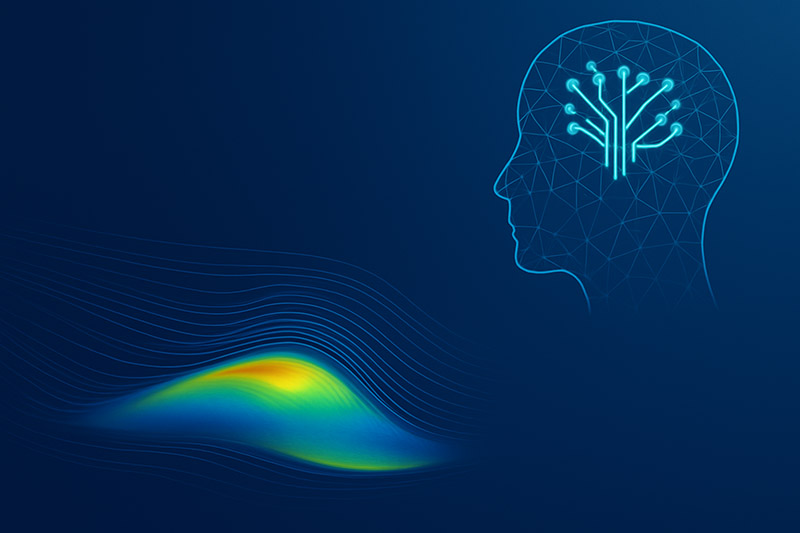The fields of computational fluid dynamics and artificial intelligence are converging, creating a new era in engineering and research. Traditional CFD simulation has long been essential for design and analysis. However, its heavy computational demands often become a bottleneck. With AI in CFD analysis, this challenge is being addressed. The integration is not just an optimization—it is a fundamental shift. It enables unprecedented speed, accuracy, and innovation. At CFD Vision, we recognize this evolution and provide advanced AI-Driven CFD simulation services.
The potential of AI-Driven Computational Fluid Dynamics lies in enhancing every stage of the workflow, from pre-processing to post-processing. As a result, engineers can explore design options at a scale once thought impossible. Our CFD modeling consultants lead this transformation, delivering CFD simulation services powered by machine learning and deep learning.
The Scientific Framework of AI in CFD
The application of AI in CFD analysis goes far beyond simple data fitting. It is a scientifically rigorous field built on several key methodologies that embed a deep understanding of physics into machine learning models.
1. Accelerated Simulation via Physics-Informed Neural Networks
Traditional CFD solvers rely on discretizing the Navier-Stokes equations. This process is accurate but resource-intensive. AI-driven CFD offers a faster solution through physics-informed neural networks (PINNs). These models are trained with both data and physical laws. Consequently, they generate physically consistent results, even in regions with limited training data.
This approach produces surrogate models capable of predicting flow fields in seconds rather than hours. It is central to our CFD modeling services. Clients can perform rapid design iterations and explore a wide parameter space. For example, in aerodynamic design, PINNs allow the evaluation of thousands of airfoil shapes in minutes. Traditional methods would take days for the same task.
2. AI for Turbulence and Subgrid Scale Modeling
Turbulence remains one of the greatest challenges in computational fluid dynamics. Direct numerical simulation (DNS) is accurate but impractical for most industries. Engineers often use simplified models like RANS or LES, but these rely on assumptions that limit accuracy.
Here, AI in CFD analysis delivers significant improvements. Machine learning models trained on DNS data can produce better turbulence closures. They capture complex, non-linear relationships between flow variables. As a result, AI-driven CFD predicts turbulent viscosity and Reynolds stresses with greater fidelity. This advancement strengthens our CFD simulation services, offering reliable predictions for turbulent flows. Applications range from internal combustion engines to vehicle aerodynamics.
3. Generative AI for Novel Design Exploration
Generative AI is one of the most exciting applications of AI in CFD. Traditional optimization improves existing designs. In contrast, generative AI creates entirely new geometries optimized for fluid dynamics challenges.
Using tools like Generative Adversarial Networks (GANs) or variational autoencoders (VAEs), AI learns from datasets of high-performance fluidic shapes. Once trained, it generates novel designs for heat sinks, turbine blades, or air ducts. These shapes often go beyond human intuition, offering revolutionary solutions. As CFD modeling consultants, we use this approach to help clients achieve breakthrough designs, not just incremental improvements.
The Role of Our CFD Simulation Consulting
The successful implementation of AI-Driven Computational Fluid Dynamics is a complex task that requires specialized expertise in both fields. It is not simply a matter of applying a machine learning algorithm; it requires a deep understanding of fluid physics, numerical methods, and data science principles.
Our CFD simulation consulting provides the bridge between these disciplines. We work closely with our clients to:
- Identify the right AI-driven CFD approach for their specific engineering problem.
- Curate and prepare high-quality training data from existing simulations or experimental data.
- Develop and validate custom AI models that are robust and physically consistent.
- Integrate AI solutions into their existing design and analysis workflows.
The synergy between our deep domain knowledge and these advanced AI techniques allows us to offer unmatched CFD simulation services. We believe that the future of engineering simulation is collaborative, with the human expert and the AI partner working together to solve the world’s most challenging problems. This is the vision of our CFD consulting. For more information, please see our page on Our Expertise and Services.
Learn more about how our product design services can bring smarter, more efficient solutions to your engineering challenges.
For researchers and engineers who want to build long-term capability, our CFD Teaching and academic mentorship programs focus on developing independent simulation skills. This approach ensures you understand the physics and numerical methods behind your models, not just the software workflow.

